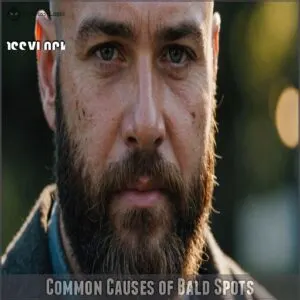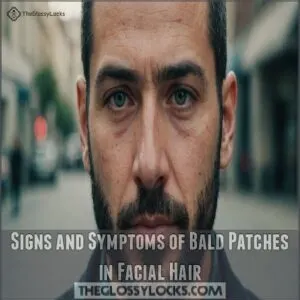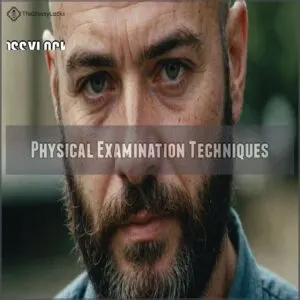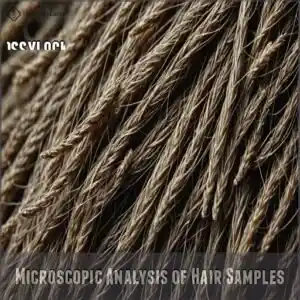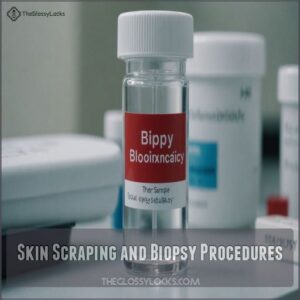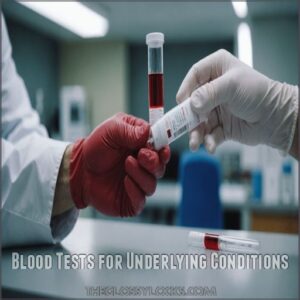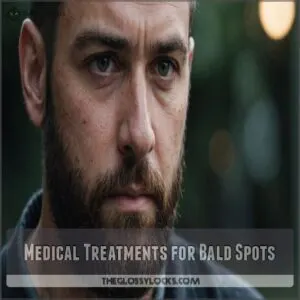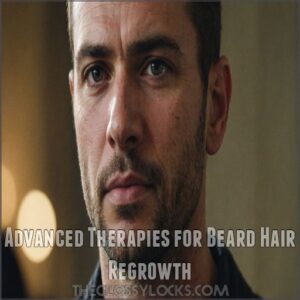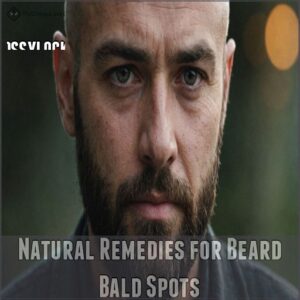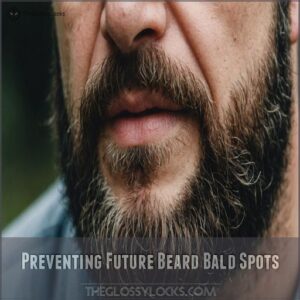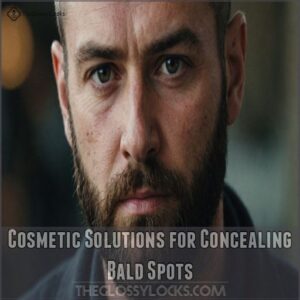This site is supported by our readers. We may earn a commission, at no cost to you, if you purchase through links.
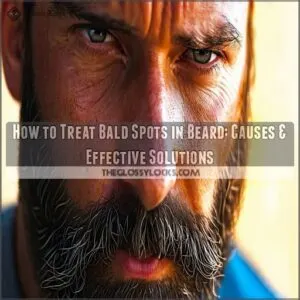 Wondering how to treat bald spots in your beard? You’re not alone.
Wondering how to treat bald spots in your beard? You’re not alone.
Minoxidil is a popular choice that’s been shown to stimulate hair growth.
If you’re looking for something more advanced, Platelet Rich Plasma (PRP) therapy could be your ticket to a full beard—sounds futuristic, right?
Hair transplants are also an option if you’re aiming for density.
Of course, don’t overlook stress and nutrition, as they play sneaky roles too.
And, if all else fails, embrace the “patchy yet rugged” look—some say it’s quite the style!
Curious about more effective solutions? Well, you’re on the right track.
Table Of Contents
- Key Takeaways
- Common Causes of Bald Spots
- Identifying Beard Bald Spots
- Medical Treatments for Bald Spots
- Advanced Therapies for Beard Hair Regrowth
- Lifestyle Changes to Promote Beard Growth
- Natural Remedies for Beard Bald Spots
- Preventing Future Beard Bald Spots
- Cosmetic Solutions for Concealing Bald Spots
- Frequently Asked Questions (FAQs)
- How to prevent beard bald spots?
- Is there a cure for balding?
- How do you treat a bald patch in a beard?
- What causes a bald spot in your beard?
- Do bald spots affect your beard?
- How do you treat hair loss on a beard?
- How do I fix bald spots on my beard?
- Can you regrow patchy beard?
- Do beard patches fill in?
- Can a bald spot grow back?
- Can stress cause beard hair loss?
- What vitamins support beard hair growth?
- Does shaving improve patchy beard appearance?
- Is beard oil effective for bald patches?
- How long does beard hair regrowth take?
- Conclusion
Key Takeaways
- Identify the cause of bald spots in your beard, whether it’s due to autoimmune issues like alopecia areata, fungal infections, or stress, and address these underlying factors for effective treatment.
- Explore medical treatments such as minoxidil, corticosteroids, or PRP therapy to stimulate beard growth and combat bald patches, but always consult with a healthcare professional.
- Incorporate lifestyle changes including a balanced diet rich in vitamins, stress management techniques, and proper grooming practices to support healthy beard growth.
- Embrace natural remedies like essential oils and herbal supplements to enhance beard health, or consider concealing bald spots with cosmetic solutions like makeup or beard fibers if desired.
Common Causes of Bald Spots
When you notice bald spots in your beard, it’s often due to a variety of causes like autoimmune disorders, fungal infections, and those pesky mechanical causes.
Understanding these reasons helps you manage your beard’s appearance and keeps those patches from playing peek-a-boo with your self-esteem.
Autoimmune Disorders: Alopecia Areata and Barbae
Alopecia areata, a tricky foe, sneakily causes beard bald spots. Your immune system mistakenly attacks your hair follicles. But don’t fret—you’re not alone, and options abound!
- Explore treatment options like corticosteroids
- Understand the emotional impact and find support groups
- Learn to live with alopecia
- Identify alopecia areata triggers
- Consider therapies for beard hair loss
Fungal Infections: Ringworm and Sycosis Barbae
Got itchy, flaky skin on your chin? Might just be a fungus among us—ringworm and sycosis barbae are notorious culprits for beard bald spots.
For a fungal infection diagnosis, consult your doc.
Tinea barbae treatment options include over-the-counter antifungals, while prevention involves good hygiene and maybe a dash of home remedies.
Stay sharp, and keep that beard majestic!
Mechanical Causes: Pseudofolliculitis Barbae and Traction Alopecia
Ever wondered why your beard’s got bald spots? Pseudofolliculitis barbae and traction alopecia might be the culprits.
These mechanical causes can stem from everyday habits:
- Shaving techniques that lead to ingrown hairs
- Certain beard products that aren’t right for your skin
- Tight hairstyles pulling on your facial hair
Tackling these can help restore beard growth and minimize facial hair loss.
Medical Conditions: Syphilitic Alopecia and Cutaneous T-Cell Lymphoma
Beyond shaving mishaps, some beard bald spots stem from serious medical issues.
Syphilis, for example, can cause hair loss, and in such cases, syphilis hair loss treatment products may be explored.
Similarly, cutaneous T-cell lymphoma, a type of cancer, can also lead to patchy beards.
Syphilis hair loss treatment should be guided by a medical professional.
Early diagnosis is critical for effective Syphilis treatment and T-cell lymphoma diagnosis.
Don’t hesitate to see a doctor if you’re concerned; they can help determine the cause and recommend appropriate medical treatments.
Remember, early intervention often leads to better outcomes.
External Factors: Stress, Nutrition, and Medications
Life’s little stressors can leave a big impact, including on your beard.
Stress, poor nutrition, and certain medications can lead to beard bald spots or alopecia barbae.
Maybe you’re juggling too much or skipping meals—your beard feels it!
Consider lifestyle changes, like a balanced diet and stress management, to boost hair health.
Consult a doctor to address potential medication side effects.
Identifying Beard Bald Spots
Noticing a bald spot in your beard can feel like finding a pothole on your face, but identifying the underlying cause is the first step in tackling the issue.
Look out for symptoms like sudden patchy hair loss or irritation.
Consider a closer examination by a healthcare provider to pinpoint what’s going on.
Signs and Symptoms of Bald Patches in Facial Hair
Detecting beard bald spots can feel like spotting a mysterious visitor.
You might notice:
- Patchy beard appearance with uneven growth areas.
- Hair loss patterns forming circular patches, typical of Alopecia Barbae.
- Itching and irritation that might drive you up the wall.
- Skin discoloration or changes in beard texture, adding to your puzzle.
Recognizing these signs is the first step to action.
Physical Examination Techniques
Take a closer look at your beard using visual inspection to spot those pesky bald spots.
You might notice Alopecia Barbae areas.
Add a scalp palpation to feel for unusual textures.
Chat with a dermatologist for a thorough hair loss diagnosis.
They might suggest a scalp biopsy or other techniques for a thorough understanding, making hair loss less intimidating.
Microscopic Analysis of Hair Samples
Microscopic analysis of hair samples is like peering through a window into your beard’s health.
You’ll understand beard bald spots by examining hair shaft analysis and follicle morphology.
Here’s how it helps:
- Trichoscopy: Visualizes hair cycle stages.
- Detects Microsporum canis: Identifies fungal infections.
- Alopecia Barbae insight: Assists in targeting hair loss treatment.
This microscopic peek guides effective solutions for hair loss.
Skin Scraping and Biopsy Procedures
Ever wondered why your beard has bald spots?
Skin scraping and biopsy procedures can help identify the culprits.
These techniques involve taking small samples for lab analysis to reveal conditions like fungal infections or Alopecia Barbae.
While there are some procedure risks, proper sample preparation and understanding biopsy types guarantee accurate results interpretation.
Don’t stress—knowledge is power!
Blood Tests for Underlying Conditions
Some blood tests can help uncover the root cause of your beard bald spots.
They’re your secret weapon against Alopecia Barbae!
Understanding the underlying causes, such as autoimmune diseases like alopecia areata triggers, can also aid in diagnosis.
Your doctor might order tests to check for:
- Hormonal imbalances (like low testosterone).
- Thyroid function issues.
- Iron or vitamin deficiencies.
These tests help determine if an underlying medical condition is hindering beard growth.
Don’t let patchy spots win—get the answers you need!
Medical Treatments for Bald Spots
When tackling beard bald spots, medical treatments offer reliable solutions.
You’ll find options like corticosteroid injections, antifungal treatments, and minoxidil that can help your beard reclaim its glory and even make it the talk of the town—well, at least among your friends.
Corticosteroid Injections and Topical Applications
Noticed bald spots in your beard? Don’t fret.
Corticosteroid injections and topical applications might help tackle Alopecia Barbae.
Injections can reduce inflammation, but watch out for side effects.
Balancing injection frequency and application duration becomes key.
Although results vary, success rates offer hope.
Consider costs against gains, and consult a pro to boost your beard growth battle plan.
Immunotherapy Options
You’re facing beard bald spots and immunotherapy might be your ally.
Consider diphencyprone, a treatment that retrains your immune system to stop attacking hair follicles.
While not wholly free of side effects or low cost, its success rates are promising.
Compare it with steroid creams or injections, and embrace a path that works best for your alopecia barbae.
Antifungal Medications for Infections
If beard bald spots have you scratching your head, and the suspected culprit is tinea barbae, then antifungal medications are your knight in shining armor.
Options range from over-the-counter solutions to prescription strength.
Whether dealing with pesky patches or aiming for a full, glorious beard, understanding antifungal types and potential side effects helps you make informed choices for better beard growth.
Antibiotics for Bacterial Folliculitis
After battling fungal infections, let’s address bacterial folliculitis, a pesky cause of bald spots in your beard.
Antibiotics, your trusty sidekicks, can help fight this bacterial invasion.
Common antibiotics target the infection and can reduce inflammation, encouraging beard growth.
For instance, understanding the underlying causes of beard hair loss, such as alopecia areata and fungal infections, is essential to guide targeted treatment plans.
Remember, the duration might vary, and watching out for side effects is key.
Prevention is always better than running for medicine later!
Minoxidil and Other Hair Growth Stimulants
Minoxidil and other hair growth stimulants can be your secret weapon against beard bald spots. This over-the-counter solution boosts follicle activity and promotes regrowth. Yet, it’s not without side effects.
- Compare Minoxidil vs. finasteride
- Understand stimulant effectiveness
- Consider over-the-counter options
- Track your hair growth timeline
- Consider Alopecia Barbae influences
Stay patient and consistent!
Advanced Therapies for Beard Hair Regrowth
If simpler treatments haven’t worked for your patchy beard, you might consider exploring more advanced options.
These include techniques like platelet-rich plasma therapy and low-level laser therapy, which can stimulate hair growth in some individuals.
Platelet-Rich Plasma (PRP) Therapy
Feeling like your beard’s playing hide and seek?
PRP therapy might be your ace card.
It involves taking your blood, spinning it to concentrate platelets, and injecting it back to boost hair growth.
While not cheap, it’s a promising hair loss treatment option.
Weigh PRP’s success rates and risks against alternatives like Minoxidil for informed beard restoration decisions.
Low-Level Laser Therapy (LLLT)
Ever tried low-level laser therapy (LLLT) for those pesky beard bald spots?
This advanced technique uses safe laser devices to boost hair growth right at home.
Research suggests LLLT stimulates hair follicles, promoting thicker beard growth and preventing hair loss.
Just weigh the LLLT cost and device options, keeping safety in mind.
It’s like giving your beard a motivational speech!
Exciplex Light Treatment
You’ve explored laser ways; now, let’s shine some light on Exciplex light treatment.
This advanced UV therapy targets Alopecia Barbae, aiming to stimulate beard growth and reduce bald spots.
For those interested in exploring Exciplex-based products, check out this Exciplex Beard Solution.
Clinical trials hint at its effectiveness, though watch for side effects and treatment costs.
It’s a modern approach with promise, strong like your morning coffee, minus the jitters.
Microneedling Techniques
Picture microneedling as giving your beard’s bald spots a wake-up call.
This treatment uses tiny needles to stimulate the skin, boosting circulation and collagen for better beard growth.
It’s important to choose the right device and set the proper needling depth.
Frequency matters too—don’t overdo it.
Follow an aftercare routine to keep your skin happy, and you’re set.
Stem Cell Therapy Potential
Imagine harnessing the potential of stem cells for beard bald spots.
Stem cell therapy holds promise with options like Stem Cell Banking and Mesenchymal Cells showing encouraging results in Hair Growth Trials.
These techniques, such as Adipose Tissue Transplant, utilize methods similar to hair growth treatment for alopecia, which could offer a new frontier in hair growth treatment, transforming facial hair transplantation into a viable solution.
It’s an exciting time for beard enthusiasts!
Lifestyle Changes to Promote Beard Growth
Want a fuller, healthier beard?
Making simple lifestyle changes, like eating right, managing stress, and getting enough sleep, can greatly improve beard growth and help fill in those pesky bald spots.
Dietary Modifications for Hair Health
Now that you’ve explored advanced therapies, let’s dish out some dietary tips for healthier hair.
What you chow down on matters:
- Food for Hair: Think salmon for those Omega-3 benefits.
- Vitamin D Impact: Mushrooms can help.
- Mineral Rich Diets: Consider spinach for iron.
Eating right boosts hair growth, thickening, and regrowth!
Stress Management Techniques
You’ve nourished your beard from the inside; let’s tackle stress next.
Stress management can help your beard thrive. Try mindfulness exercises or meditation practices for emotional balance. Yoga and breathing techniques fight stress, promoting hair growth.
Addressing stress boosts men’s self-esteem and is key to reducing beard bald spots. Keep calm and let your beard flourish naturally.
Proper Beard Care and Grooming Practices
Think of your beard as a plant—care nurtures growth. With regular beard washing and conditioning, you can prevent beard bald spots.
Emphasize trimming techniques to keep unruly hairs in check.
Applying beard oil moisturizes and adds shine. Don’t forget combing methods for smooth styling.
Regular barber visits guarantee professional beard grooming and care, boosting confidence.
Exercise and Circulation Improvement
Let’s explore how exercise boosts circulation for beard growth, bridging from grooming to action.
Regular exercise can also boost testosterone levels, as seen in the fundamentals of beard growth, which play a significant role in beard thickness. Beard Growth Fundamentals.
Improve blood flow with these activities:
- Yoga for Circulation: Flow through poses like downward dog.
- Facial Massage: Boost blood flow with gentle rubs.
- Cardio for Growth: Jog or cycle regularly.
- Morning Stretching: Wake up your body and beard follicles daily.
Sleep Optimization for Hair Growth
Getting enough sleep is key for beard health.
Sleep Cycles Matter; aim for 7-9 hours of restful nights.
A good pillowcase material, like silk, can help. Consider a Beard Sleep Mask for uninterrupted sleep.
Melatonin for hair growth isn’t scientifically proven, but prioritizing sleep definitely helps. Think of it as giving your body the time it needs to repair and grow. Better sleep equals better beard growth – it’s that simple!
Natural Remedies for Beard Bald Spots
If your beard resembles a patchy quilt, don’t worry—nature’s got some tricks up its sleeve.
From essential oils to herbal supplements, these natural remedies might just help revive those bald spots while giving your facial hair a bit of character.
Essential Oils for Hair Stimulation
You’ve mastered lifestyle changes to boost beard growth, so consider adding essential oils to your toolkit for those pesky bald spots.
Rosemary oil promotes growth, while peppermint oil invigorates follicles. For a more in-depth look at essential oils for hair, including their benefits and risks, check out essential oils for hair.
Try lavender oil for its calming effect—your beard will thank you! Tea tree and eucalyptus oils offer antibacterial properties, helping keep your patchy beard in check.
Don’t overlook trusty castor oil either!
Herbal Supplements and Their Efficacy
Shifting from essential oils to herbal supplements, these natural remedies might just tickle your beard’s fancy.
Here’s a quick rundown:
- Biotin: Known for its effectiveness in bolstering hair health.
- Fenugreek: Offers benefits for fostering growth.
- Turmeric: Supports robust hair.
- Ginseng: Considered among effective beard growth supplements.
Each aids in combating beard bald spots uniquely.
Scalp Massage and Acupuncture
Herbal supplements are great, but ever tried scalp massage or acupuncture for beard bald spots?
These techniques both stimulate hair follicle growth and reduce stress. Imagine massaging with aromatic oils or hitting the right scalp pressure points. Acupuncture techniques might sound ancient, yet they’ve helped many.
| Remedy | Benefit | Technique |
|---|---|---|
| Scalp Massage | Stress reduction | Massage Oil Benefits |
| Acupuncture | Hair growth | Facial Reflexology |
| Essential Oils | Aromatherapy effects | Hair Follicle Stimulation |
| Pressure Points | Relaxation | Acupuncture Techniques |
| Reflexology | Circulation boost | Beard Growth |
Aloe Vera and Other Topical Applications
When considering natural remedies, aloe vera gel can be your beard’s best friend.
This humble hero isn’t just for sunburn.
Its moisturizing properties may support hair restoration, adding a pinch of charm back to those stubborn bald spots.
Use it as part of your topical applications, like beard masks or herbal pastes, to enhance your beard growth journey.
Ayurvedic and Traditional Chinese Medicine Approaches
So, you’ve tried aloe vera? Let’s explore other natural paths.
Ayurvedic and Traditional Chinese Medicine offer interesting approaches to beard bald spots. Consider these options:
- Ayurvedic Herbs: Boosting hair growth naturally.
- Traditional Chinese Remedies: Restoring Qi Flow Balance.
- Acupuncture Techniques: Stimulating hair follicles.
- Herbal Supplements: Supporting overall beard health.
These methods might help you regain control over your beard’s appearance.
Preventing Future Beard Bald Spots
Keeping your beard lush means you need to identify and avoid potential triggers like stress and environmental damage.
Regular check-ups and proper grooming techniques can also serve as your beard’s best defense against unwanted bald spots.
Identifying and Avoiding Triggers
Your beard’s best friend? Smart habits.
Steer clear of beard care mistakes like tugging too hard while shaving; it’s a recipe for bald spots.
Minimize stress with stress reduction techniques—your whiskers will thank you.
Don’t skip out on good nutrition; it impacts hair growth.
Watch out for hormonal imbalances, and remember, smoking doesn’t just hurt lungs—it encourages hair loss too.
Regular Check-ups and Early Intervention
Think of regular check-ups as your beard’s backstage pass to the health spotlight.
Early intervention could be the secret sauce to staying ahead of bald spots.
- Schedule doctor visits: Keep track of changes.
- Beard health checks: Catch issues early.
- Follow a healthy habits routine: Boost beard growth and resilience.
Maintaining a Healthy Immune System
A robust immune system is your secret weapon against beard bald spots.
Focus on gut health with probiotics and add a dash of sunlight for Vitamin D.
Toss in stress reduction techniques, like meditation or yoga, to keep immune boosters in top shape.
Remember, it’s not just about skincare; balanced beard growth hormones rely on a well-maintained immune system.
Proper Shaving and Grooming Techniques
Shaving your beard right goes hand in hand with staying healthy.
Tackle beard bald spots by honing your grooming techniques.
Use beard shaping methods to get that look just right.
Try shaving cream alternatives for a smoother experience, and keep your razor maintained to sidestep irritation.
After all, a well-groomed beard keeps you looking sharp and feeling unstoppable!
Environmental Protection for Facial Hair
Wrap up your beard routine with environmental protection to fend off bald spots.
Guard against UV rays with beard sunscreen, and use a filter for hard water damage.
Climate change impacts, air pollution effects, and beard smoking risks shouldn’t be underestimated.
A proactive approach with these beard care strategies can keep your beard’s growth cycle smooth and healthy.
Cosmetic Solutions for Concealing Bald Spots
Let’s face it, those pesky beard bald spots can be a real confidence killer.
Luckily, there are some clever cosmetic solutions to help you regain your swagger. Makeup concealers, specifically those designed for men’s facial hair, can easily camouflage those stubborn gaps.
You can also explore beard fibers or hair fibers spray, such as beard fibers spray products, which cleverly blend in with your existing beard, creating a fuller look.
For more permanent solutions, consider micropigmentation tattooing, a technique that mimics the look of real beard hair. This is a bit more of an investment, but the results can last for years.
Remember, choosing the right beard style can also work wonders in minimizing the appearance of bald spots. Experiment with different beard styles to find one that complements your facial features and flawlessly hides those thin areas.
There are many options for you to explore.
Frequently Asked Questions (FAQs)
How to prevent beard bald spots?
Imagine this: a beard you can be proud of without patches.
Maintain a balanced diet, manage stress, and avoid harsh grooming habits.
Consider minoxidil or essential oils for growth, and keep your beard clean and moisturized.
Is there a cure for balding?
There’s currently no cure for balding, but you can manage it.
Treatments like minoxidil, finasteride, or even hair transplants can slow hair loss and encourage regrowth.
Embrace your unique flair, or explore stylish, fresh looks!
How do you treat a bald patch in a beard?
Don’t worry if your beard’s playing hide and seek.
Treat bald spots by using minoxidil, trying microneedling, and applying peppermint oil.
Also, eat well, sleep enough, and manage stress.
Embrace your beard’s journey, even the patchy parts!
What causes a bald spot in your beard?
Several things can cause beard bald spots: genetics, stress, hormonal imbalances, or even skin conditions like ringworm. It’s a common problem, so don’t worry! Let’s figure out what’s happening.
Do bald spots affect your beard?
Bald spots can disrupt your beard’s uniform look, making it appear uneven or patchy.
While some flaunt the unique style, others might feel self-conscious.
Understanding the cause helps choose between embracing the look or seeking treatment.
How do you treat hair loss on a beard?
Imagine your beard’s a puzzle with missing pieces.
Use corticosteroids or minoxidil to encourage regrowth.
Tackle stress.
Nourish your diet.
Try peppermint oil.
Embrace patience, as hair might need time and care to return.
How do I fix bald spots on my beard?
You can tackle bald beard spots by letting your beard grow longer, using minoxidil, and trying microneedling.
Embrace nourishing oils like peppermint essential oil.
Managing stress and eating healthy foods can also support fuller beard growth.
Can you regrow patchy beard?
Growing a patchy beard may feel like a challenge, but simple steps can help.
Let it grow for two months, eat right, manage stress, try supplements, and consider minoxidil.
Embrace the process with patience and style.
Do beard patches fill in?
A whopping 92% of men see improved beard density over time.
Your beard’s patchiness often fills in naturally as you age.
Factors like nutrition and stress management play a role, so keep an eye on your lifestyle.
Can a bald spot grow back?
Bald spots might regrow, depending on the cause.
Conditions like alopecia areata are unpredictable, but treatments such as corticosteroids and minoxidil may help.
Patience is key, as hair can take months to show progress.
Can stress cause beard hair loss?
Yes, stress can absolutely trigger beard hair loss.
It’s a common culprit in alopecia areata, an autoimmune condition.
Managing stress might help, but see a doctor for proper diagnosis and treatment.
What vitamins support beard hair growth?
Vitamins like A, B-complex (especially Biotin), C, D, and E can promote beard growth.
These vitamins support cell turnover and enhance blood circulation to hair follicles.
Combine these with a balanced diet and watch your beard thrive!
Does shaving improve patchy beard appearance?
Worried shaving might worsen patchiness?
Actually, trimming your beard to a uniform length can make it look fuller and neater.
Think of it like mowing a patchy lawn—it tidies up uneven growth for a better appearance.
Is beard oil effective for bald patches?
Beard oil nourishes hair and skin, potentially improving overall beard health.
It can soften and condition existing strands, helping distribute nutrients, which might create a fuller appearance over time.
It won’t regrow hair in bald patches.
How long does beard hair regrowth take?
Regrowing beard hair can vary widely, typically taking anywhere from a few weeks to several months, depending on factors like genetics, age, and health.
Boost growth with good nutrition, stress management, and proper hair care routines.
Conclusion
Balancing hope and reality, treating beard bald spots involves understanding the root causes like stress and nutrition, and exploring treatments from Minoxidil to PRP therapy.
While advanced options exist, the key is identifying what works specifically for you.
Keeping a healthy lifestyle, including adequate sleep and stress management, supports your efforts.
And if the pursuit of a full beard falls short, embracing the “patchy yet rugged” can be a stylish and confident choice.

